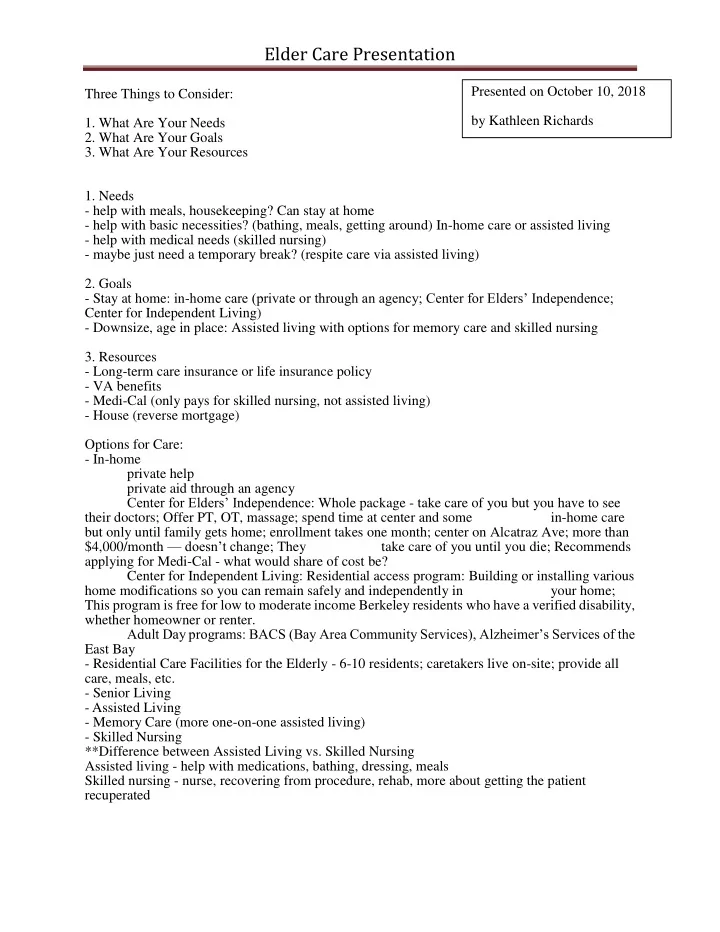

Elder Care Presentation Presented on October 10, 2018 Three Things to Consider: by Kathleen Richards 1. What Are Your Needs 2. What Are Your Goals 3. What Are Your Resources 1. Needs - help with meals, housekeeping? Can stay at home - help with basic necessities? (bathing, meals, getting around) In-home care or assisted living - help with medical needs (skilled nursing) - maybe just need a temporary break? (respite care via assisted living) 2. Goals - Stay at home: in- home care (private or through an agency; Center for Elders’ Independence; Center for Independent Living) - Downsize, age in place: Assisted living with options for memory care and skilled nursing 3. Resources - Long-term care insurance or life insurance policy - VA benefits - Medi-Cal (only pays for skilled nursing, not assisted living) - House (reverse mortgage) Options for Care: - In-home private help private aid through an agency Center for Elders’ Independence: Whole package - take care of you but you have to see their doctors; Offer PT, OT, massage; spend time at center and some in-home care but only until family gets home; enrollment takes one month; center on Alcatraz Ave; more than $4,000/month — doesn’t ch ange; They take care of you until you die; Recommends applying for Medi-Cal - what would share of cost be? Center for Independent Living: Residential access program: Building or installing various home modifications so you can remain safely and independently in your home; This program is free for low to moderate income Berkeley residents who have a verified disability, whether homeowner or renter. Adult Day programs: BACS (Bay Area Community Services), Alzheimer’s Services of the East Bay - Residential Care Facilities for the Elderly - 6-10 residents; caretakers live on-site; provide all care, meals, etc. - Senior Living - Assisted Living - Memory Care (more one-on-one assisted living) - Skilled Nursing **Difference between Assisted Living vs. Skilled Nursing Assisted living - help with medications, bathing, dressing, meals Skilled nursing - nurse, recovering from procedure, rehab, more about getting the patient recuperated
Elder Care Presentation How much does it cost? - Home health aide: $20/hr (private); $28/hr-$35/hr (through agency) - Center for Elders’ Independence: more than $4,000/month (all inclusive; take care of all your needs) — doesn’t change - Residential Care Facility for the Elderly ($3,000-$4,000+per month); pay month to month, 30-day notice to vacate - Assi sted living/memory care = rent + “care plan” (depending on level of need) Mercy Center: Assisted living = $210/day + care plan (additional $20-$100/day) = $7,130 per month (low end) - $9,610 (high end) Memory care = $300/day + care plan (additional $45-$85 per day) = $10,695 (low end) - $11,935 (high end) Silverado (Berkeley): Shared room long-term - $300 or $320/day = $9,300-$9,920/month One-time fee (administrative fee) - only for long-term (not respite) = $6,500 How to Pay? - In-home: Long-term care insurance In-Home Supportive Services - Must be on Medi-Cal, be blind, disabled, or 65 years of age or older, AND be unable to live at home safely without help. Out of pocket - Assisted Living/Memory Care Any long-term care has to be paid out of pocket (e.g., reverse mortgage, selling house) VA benefits (you or your spouse must have served at least one day in active wartime) - Wartime veterans, or their surviving spouses, become eligible for the Special Monthly Pension benefit when they are over 65 years of age, are permanently disabled and unable to work, are homebound, or need the regular aid and attendance of another — whether at home, in assisted/supportive living, or in a nursing home. The program is based on actual financial need for assistance, so there are income and asset limitations. There are attorneys and organizations that can help you qualify - note that it is illegal to charge a veteran a legal fee for providing assistance in filing a claim for benefits Assisted Living Waiver (to help transition from skilled nursing to Assisted Living; must have full-scope Medi-Cal eligibility with zero share of cost) - Skilled Nursing Medi-Cal: Seek legal assistance to find out how to qualify VA benefits Reverse mortgage How to Find Places? - In-home care (agencies or word of mouth) - Assisted Living/memory care (referral agencies - Safe Senior Options, A Place for Mom- although I don’t recommend them) Contacts: VA Benefits: Apply for Aid and Attendance Benefit: https://www.benefits.va.gov/pension/aid_attendance_housebound.asp Free help with qualifying for VA Benefits: Jamie Cabrera, jamie@americanabp.com, 650-779-5468
Elder Care Presentation In-Home Supportive Services (program of Alameda County): https://www.alamedasocialservices.org/public/services/elders_and_disabled_adults/in_home_Su pportive_services.cfm Referral agents for assisted living, memory care, residential care facilities for the elderly: (they work on commission, services are free to client) Ned Rozbicki, ned@safesenioroptions.org, (415) 275-1636, www.SafeSeniorOptions.org (recommended by Jamie Cabrera) Linda Iwamoto, 925-352-4155, linda.berkiwamoto@gmail.com (recommended by Mercy Center) Center for Elders’ Independence: 844-319-1150, https://cei.elders.org/ Bay Area Community Services (BACS) Adult Day Program: 510.613.0330, https://www.bayareacs.org/adult-day-programs/ Alzheimer’s Services of the East Bay: (510) 644-8292 (Berkeley campus), http://aseb.org/ Center for Independent Living: Residential Access Program (help with making home more accessible): Margie Cochran, Residential Access Coordinator, mcochran@thecil.org, or contact The CIL at 510-841-4776 Elder Care Attorney: Michael J. Young, (925) 256-0298, http://www.walnutcreekelderlaw.com/ *Disclaimer: None of this should be considered legal advice. Please consult your attorney for professional legal advice.
Recommend
More recommend